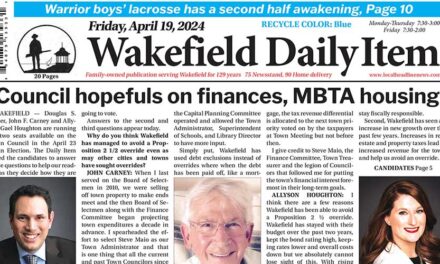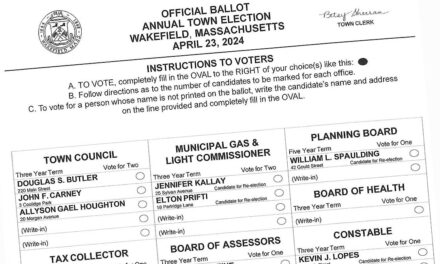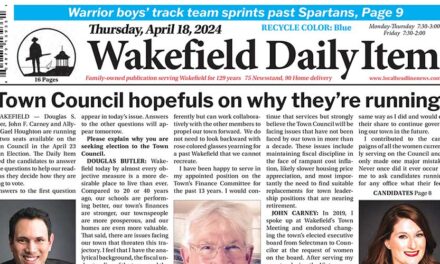By GAIL LOWE
WAKEFIELD — Discussions continued at last night’s school board meeting about the possibility of offering tuition-free full-day kindergarten (FDK) in Wakefield starting with the 2015-2016 academic year.
Tomorrow night, Dec. 11, parents will have the opportunity to listen to Superintendent of Schools Dr. Stephen K. Zrike’s presentation about FDK and ask questions at an information session at the Woodville School (7 to 8:30 p.m.)
School board member Anne Danehy pointed out at the meeting that demand is high for FDK, citing enrollment numbers in Wakefield as of Oct. 1 at 143 students in FDK, compared to 55 students enrolled in the half-day program. The total number of students enrolled in FDK throughout Massachusetts is 61,678 students or 88.3 percent of the population for that age group. Currently, 242 communities in the state offer tuition-free FDK.
Member Gregory Liakos said he views offering tuition-free kindergarten as a “growth strategy” for the town.
“It’s a strong message to attract new families,” he said. “The School Committee needs to get behind this.”
Next steps in the process of bringing full-day kindergarten to the town is threefold: Advocacy for the program, discussions with Town Administrator Stephen P. Maio and budget preparation.
In Dr. Zrike’s proposal, he outlined a rationale for expansion of the kindergarten program, including curriculum changes, academic performance, equity and social and emotional development, which includes improved conduct and socialization and less student frustration and stress.
Increased expectations of what kindergarten age children need to know has grown from one standard to five others over a 10-year period, Zrike said.
In 2001, for example, kindergarteners were expected to be able to print upper and lower case letters of the alphabet. But today that standard has been expanded to include:
• Use frequently occurring nouns and verbs.
• Form regular plural nouns orally by adding “s” or “es” (as in dogs or fences)
• Understand and use question words such as “who,” “what,” “where,” “when,” “why” and “how.”
• Use the most frequently occurring prepositions (to, from, in, out, as examples).
• Produce and expand complete sentences in shared language activities.
Children enrolled in pre-kindergarten are also expected to use a combination of dictating and drawing to explain information about a topic and kindergartners should add writing to dictating and drawing to compose explanations in which they name what they are writing about and supply some information about the topic.
Expectations about mathematics knowledge also has expanded to include counting and cardinality, operations and algebraic thinking, numbers and operations in base 10, measurement and data and geometry.
In 2000, kindergarten students were expected to be able to count by ones to at least 20 and count by fives and 10s at least up to 50. They were also expected to match quantities up to at least 10 with numerals and words. Today, they are expected to count to 100 by ones and 10s, write numbers from 0 to 20, represent a number of objects with a written numeral from 1 to 20 and count forward beginning from a given number.
In 2000, operations and algebraic thinking was limited to kindergarten students using objects and drawings to model and solve related addition and subtraction problems to 10. Today, students must decompose numbers less than or equal to 10 into pairs in more than one way. For example, an equation might be 5 = 2 + 3.
Both Liakos and Danehy expressed concerns about the higher standards and hoped they would not take the fun out of learning. Dr. Zrike agreed and said there “still needs to be room for enjoyment in the classroom.”
Despite the expanded rigor, MCAS scores for grade 4 students show that students who attended FDK scored six points higher in English Language Arts than students who attended half-day sessions. In math, FDK students scored five points higher than their half-day counterparts.
“Half-day kindergarten students fall behind their full-day peers,” said Zrike.
Maio said, “We are just starting the budget process right now. In some preliminary discussions, Dr. Zrike has stated that the cost of FDK is in the area of $650,000 to $700,000. As we go forward, this is another factor that we will be taking into consideration.”
Maio added that he is hopeful FDK will attract more students, which will attract more state aid.
“When you look at the recent state budget deficits, however, we cannot be sure of what will happen,” said Maio. “Dr. Zrike and I speak daily on many issues and the expense for FDK is and will be part of the entire budget process but ultimately it will go to the community (at Town Meeting) to see what it wants.”
In his proposal, Zrike provided a brief financial analysis stating the following:
• Kindergarten enrollment will increase by at least 25 students.
• Salary assumptions are based on current labor agreements.
• Chapter 70 aid projection is the best case scenario and based upon the current formula for FY’15.
• Tuition loss costs are based on 2014-2015 enrollments.
• Anticipation of Transition Planning for FDK Planning grant from the Department of Elementary and Secondary Education.
Zrike noted that the impact on the town budgets is not considered in this analysis and that space is not a concern.
A one-time expense impact would be about $20,000 for transition expenses, including materials, supplies and technology.
The total ongoing expense impact would be $96,246 after factoring in additional teachers, specialist teachers and instructional support. Cutting the mid-day bus run would result in a $7,560 savings.




